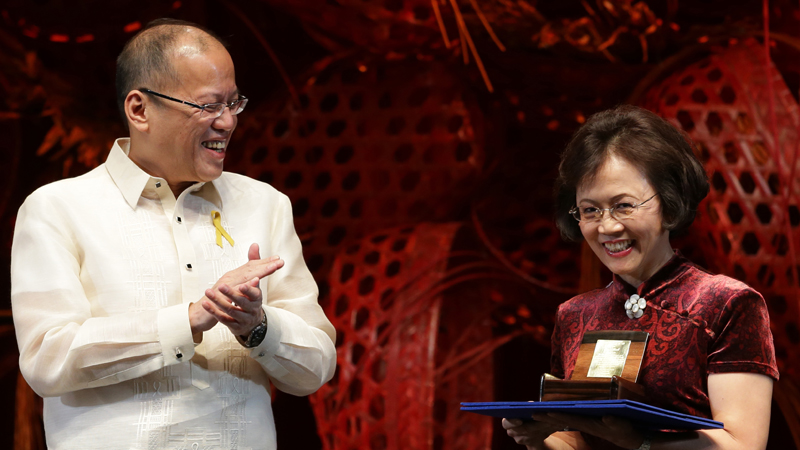
FEARLESS CHINESE President Aquino applauds 2014 Ramon Magsaysay awardee investigative journalist Hu Shuli of China during ceremonies at the Cultural Center of the Philippines in Pasay City on Sunday. AP
MANILA, Philippines–Whoever said journalists can’t do a good job in China clearly hasn’t met Hu Shuli and the growing number of her colleagues dedicated to “shedding light on the unseen and lending a voice to the unheard.”
Being dubbed the “most dangerous woman in China” is a badge the 61-year-old Hu proudly wears, which she has earned for her pursuit of truth and accountability in a nation known for media censorship and ranked 167th out of 173 countries in the press freedom global index.
For her commitment to truth and promotion of transparency and change, Hu was bestowed the Ramon Magsaysay Award for investigative journalism, which she considers an affirmation of her belief that Chinese journalists can and continue to do a good job.
The Magsaysay Foundation board of trustees recognized Hu as a trailblazer for professional and independent-minded journalists in China, where being a “news worker” is politically risky and socially challenging.
As founder and editor of the Beijing-based business magazine Caijing (literally Finance and Economics magazine), the publication of well-researched investigative reports and uncompromising journalism has led to the ousting of corrupt public officials and the prosecution of unscrupulous corporate heads, the foundation said.
The Caijing reports also reformed business practices and lifted the veil of secrecy on incidents that China’s department of central propaganda would consider taboo for media coverage, according to the foundation.
Irregularities exposed
From 1998 to 2009, Caijing—under Hu’s stewardship—defied the conventional by exposing illegal practices in the Shanghai Stock Exchange, revealed the magnitude of the Severe Acute Respiratory Syndrome (SARS) outbreak in 2003 despite state restrictions, uncovered irregularities in the privatization of power conglomerate Luneng, and put a damper on top stock performer Yinguangxia company’s overstatement of $93 million profits in 2000, the foundation said.
In November 2009, Hu and her colleagues formed the Caixin media group which regularly publishes four periodicals, puts up online news portals, prints books and produces TV programs.
Through the multimedia platforms and with Hu as editor in chief, Caixin continued its relentless stab at corporate fraud and government corruption.
Many obstacles
This led to the investigation of a former Politburo standing committee member—the first against a senior ranking official since the beginning of communist rule in China.
In her acceptance speech at the award ceremonies, Hu cited the downfall of former Politburo member Zhou Yongkang as a testament to uncompromising journalism in China, where “journalists like me face many obstacles to perform our jobs.”
She said that when the state announced in July an investigation into Zhou’s activities, Caixin published a 6,000-word, five-part piece detailing the fallen leader’s dealings.
Family of journalists
“A colleague at Caixin, who spent a whole year leading our investigation team to unearth that story, couldn’t help but cry out loud against those who say that journalists can’t do a good job in China,” Hu said in her acceptance speech.
Hu hails from a family of journalists, starting from her grandfather Hu Zhongchi, a translator and editor of Shen Bao, and grand-uncle Hu Yuzhi, who was involved in editing and publishing.
Her mother, Hu Lingsheng, was a senior editor at Workers’ Daily, China’s second-largest newspaper.
Hu pursued the profession after finishing journalism in 1982 at Beijing’s People’s University. She worked as an assistant editor, a reporter and international editor at Worker’s Daily and as an international editor and chief reporter at China Business Times before she established Caijing.
Like a woodpecker
While employed at the Worker’s Daily in 1987, she became a fellow of the World Press Institute and was exposed to the workings of the Western media.
She published a book for her compatriots on the practice of professional journalism in the US. Soon after, she left the Worker’s Daily to work at the China Business Times.
In 1998, Hu set up Caijing, which she often compared to “a woodpecker hammering at a tree not to knock it down but to make it grow straighter.”
More than the rush brought by filing an exclusive story and making readers buzz, Hu considers the change that follows—which may come in the form of a new regulation or an industry overhaul—the most fulfilling.
‘Voice to the unheard’
“And those moments make you feel you are shedding light to the unseen, lending a voice to the unheard and illuminating a path where everyone is searching for direction,” Hu said. “These moments never come easily. But they would come, as long as you try hard and never give up.”
She said her entire professional life is dedicated to disproving naysayers who insist that journalists cannot do a good job in China.
“That is why I gathered 200 excellent journalists at Caixin and that is what keeps so many Chinese journalists continue doing their job despite the difficulties which stem from everywhere,” Hu said.
“It is a blessing to be a journalist in today’s China where there are endless stories to cover. And Chinese journalists can do a good job.”
RELATED STORIES
Keeper of Afghan culture cited
RM awardees modern-day heroes, says Aquino